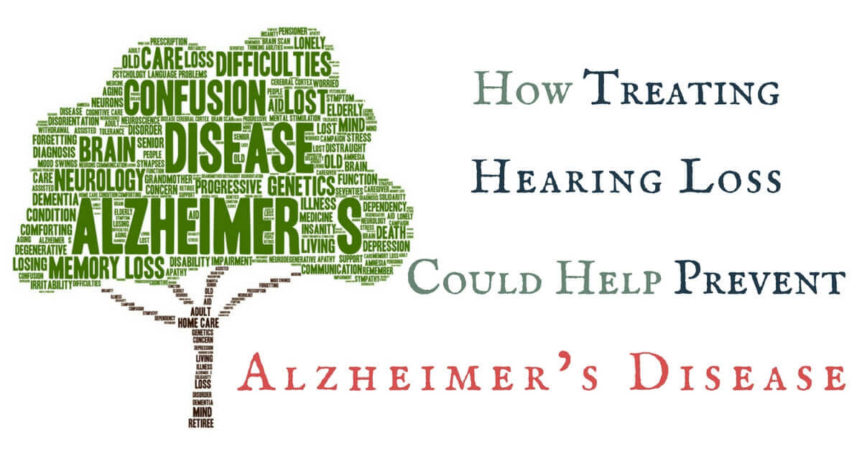November is National Alzheimer’s Awareness Month, which we recognize here at Custom Hearing Solutions. The link between hearing loss and cognitive ability has been studied for years by researchers. From these studies, we’ve learned that there is a link between hearing loss and dementia – including Alzheimer’s disease – and that treating hearing loss early on could be very beneficial to your brain’s health.
Understanding Alzheimer’s Disease (and Dementia)
Alzheimer’s disease, commonly referred to as Alzheimer’s, is a “type of dementia that causes problems with memory, thinking, and behavior.”
Dementia is “a general term for a decline in mental ability severe enough to interfere with daily life.” Alzheimer’s makes up 60-80% of cases of dementia. Another common form of dementia is vascular dementia, which often occurs after a stroke.
Contrary to popular belief, Alzheimer’s is not a common part of aging. In fact, people under the age of 65 may experience early-onset Alzheimer’s. As a progressive disease, Alzheimer’s does get worse over time, and it is the sixth cause of death in the US. While it is the subject of much medical research, there is not yet a cure for Alzheimer’s. Fortunately, there are many treatments to alleviate the symptoms and also delay the onset of Alzheimer’s.
According to Alzheimer’s Association, “symptoms usually develop slowly and get worse over time, becoming severe enough to interfere with daily tasks.” Symptoms of Alzheimer’s include:
- memory loss that disrupts daily life
- challenges in planning or solving problems
- difficulty completing familiar tasks at home or at work
- confusion with time or place
- trouble understanding visual images and spatial relationships
- new problems with words in speaking or writing
- misplacing things/losing the ability to retrace
- decreased/poor judgment
- withdrawal from work or social activities
Studies on Hearing Loss and Cognitive Abilities
The leading body of research on the link between hearing loss and dementia comes from Johns Hopkins University, led by Dr. Frank Lin. In a study published in 2011, it was found that seniors “with hearing loss are significantly more likely to develop dementia over time than those who retain their hearing.” Dr. Lin and team suggest that “a common pathology may underlie both [hearing loss and dementia] or that the strain of decoding sounds over the years may overwhelm the brains of people with hearing loss, leaving them more vulnerable to dementia.”
More recently, four international studies from England, Taiwan, Germany, and the journal, The Lancet have supported the findings that link hearing loss and dementia.
Using data from the English Longitudinal Study on Aging, participants (age 50 and older) with hearing loss were “more likely to have a dementia diagnosis than those with normal hearing.” The study found that “the hazard of developing dementia was 1.4 times higher in individuals who reported moderate hearing and 1.6 times higher in those who reported poor hearing.” Researchers on this study believe their data supports the general consensus among hearing health professionals: that the use of hearing aids could “help delay the onset of dementia or that hearing loss itself could serve as a risk indicator of cognitive decline.”
In the study from Taiwan, researchers compared two groups: 4,105 participants with presbycusis (age-related hearing loss) and 4,103 participants without. They found that among people with age-related hearing loss, “the risk of dementia was significantly higher (1.3 times as high).” Similarly, in a German study, researchers collected data from 154,783 people between 2006 and 2010. They found that “people with hearing impairment had a 1.2 to 1.4 times higher risk of dementia compared with people without hearing impairment.”
The Lancet’s Commission on Dementia Prevention, Intervention, and Care issued a report on the risk factors that contribute to dementia. Hearing loss was determined to be one of the nine risk factors, which also include midlife hypertension, midlife obesity, late-life depression, diabetes, smoking, and social isolation, to name a few.
While these studies specifically point to dementia, we include this information because Alzheimer’s is a form of dementia.
The Benefits of Treating Hearing Loss
Coincidentally, many of the signs of dementia and Alzheimer’s disease overlap with the signs of hearing loss. Hearing loss has the potential to cause social withdrawal and isolation, interfere with communication and memory, and make regular daily tasks more challenging.
Approximately 48 million Americans experience some form of hearing loss. It is recommended that people over the age of 55 take an annual hearing test to monitor their hearing abilities. If a hearing loss is detected, early treatment could help stave off a number of related medical conditions – including the development of dementia or Alzheimer’s disease. The use of hearing aids to treat hearing loss has been found to bring significant benefits to one’s health and well-being.
Visit Us at Custom Hearing Solutions
You don’t have to live with untreated hearing loss. If you have experienced changes in your hearing, take the first step toward better health – both physical and mental health – by visiting us at Custom Hearing Solutions.

